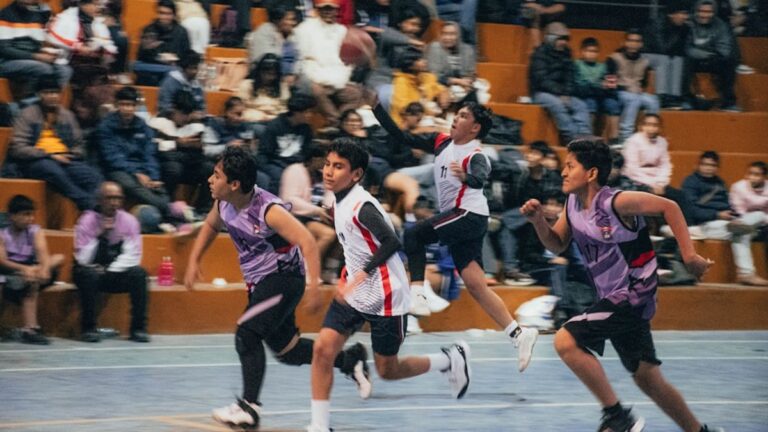Unlocking Your Mind: How Mental Fitness Can Propel Your Performance to New Heights
Have you ever watched an athlete, perhaps during the Olympics or a high-stakes championship, and marveled at their sheer focus? It’s almost as if they possess an otherworldly ability to tune out the chaos around them while honing in on their performance. But here’s a twist: what if I told you that mental fitness is just as crucial as physical prowess in sports? This concept often gets overshadowed by the glitz and glory of physical training, yet it holds the key to unlocking peak performance. Let’s dive into how nurturing your mental fitness can elevate your game—whatever that game may be.
The Foundation: What is Mental Fitness?
Mental fitness, in simple terms, refers to the capacity to maintain a positive mindset, manage stress, and think clearly under pressure. It’s like a gym for your brain, where you work on mental strength, resilience, and agility. Just as you would lift weights to build muscle, engaging in mental exercises can enhance your cognitive functions and emotional well-being.
It’s striking how often we overlook the mental side of performance. I mean, think of the countless hours athletes spend perfecting their skills while neglecting the mental conditioning that could amplify those skills. Dr. Michael Gervais, a leading sports psychologist, once pointed out that “the mind is the most powerful tool in an athlete’s arsenal.” So why not wield it effectively?
The Science of Mental Fitness
Research has consistently shown that mental fitness can significantly impact athletic performance. A study published in the Journal of Sports Psychology found that athletes who engaged in regular mental training reported improved focus, confidence, and overall performance. These aren’t just fluffy concepts—actual, measurable results.
Neuroscience also plays a huge part here. Engaging in mental practices such as visualization or mindfulness can alter brain chemistry, enhancing neural pathways associated with concentration and stress management. In layman’s terms, your brain can actually get better at handling pressure situations, much like your muscles adapt to lifting heavier weights.
Visualization: Seeing is Believing
One of the most powerful tools in the mental fitness toolkit is visualization. This technique isn’t just for mystical yogis or motivational speakers; it’s been embraced by elite athletes across the globe. For instance, Olympic gold medalist Michael Phelps has often spoken about how he visualizes every detail of his races, from the sound of the starting gun to the feeling of touching the wall. This practice allows him to prepare mentally for every possible scenario, making him more resilient when faced with unexpected challenges during actual events.
So, how do you incorporate visualization into your routine? Start by setting aside a few quiet moments each day. Close your eyes and imagine yourself performing at your best. Feel the emotions, see the success, and breathe in the experience. It might feel a bit silly at first—trust me, I had my share of giggles when I tried it initially—but give it time. The benefits are more profound than they may seem.
Mindfulness: Staying Present
Another essential aspect of mental fitness is mindfulness, which helps athletes stay present and focused. You might be thinking, “But isn’t that just meditation?” Well, yes and no. Mindfulness can be a form of meditation, but it’s also about cultivating awareness and acceptance of the current moment—something that can drastically reduce anxiety during competitions.
Consider the story of NBA superstar LeBron James. He’s known not only for his physical abilities but also for his impressive mental acuity on the court. LeBron practices mindfulness to maintain his focus during games, allowing him to make split-second decisions with clarity. The ability to stay present amidst the frenzy of a game can mean the difference between sinking the winning shot or missing a crucial opportunity.
Building Resilience: Bouncing Back from Setbacks
In sports (and life), setbacks are inevitable. How we respond to these challenges defines our trajectory. Mental fitness equips athletes with resilience—the capacity to bounce back from defeat or disappointment. Think of it as emotional armor that prevents the arrows of criticism and failure from piercing through.
I recall a conversation with a local marathon runner, Jenna, who faced significant injuries that sidelined her for months. Instead of succumbing to despair, she turned to mental fitness practices to aid her recovery. Jenna learned to reframe her mindset, viewing her injury as a temporary setback rather than a life sentence. Through visualization and positive self-talk, she not only healed but returned to race stronger than ever. Her story exemplifies the power of mental toughness.
Setting Goals: The Roadmap to Success
Goal setting is another cornerstone of mental fitness. Establishing clear, achievable goals provides direction and motivation. But here’s the twist—goals should be both outcome-focused and process-oriented. While it’s great to aim for that shiny medal or trophy, focusing on the steps to get there is equally important.
Take a cue from the world of professional cycling. Teams like Team Sky (now known as Team Ineos) often break down their season into smaller milestones, focusing on specific races, training techniques, and even nutrition plans. Each small victory builds momentum, reinforcing confidence and commitment. It’s a systematic approach that turns daunting dreams into tangible achievements.
The Role of Coaching in Mental Fitness
Now, let’s not forget the pivotal role that coaches play in fostering mental fitness. A great coach does more than just draw up plays; they act as mentors, shaping the mental landscape of their athletes. Think of coaches like Phil Jackson, who, during his time with the Chicago Bulls and Lakers, integrated mindfulness practices into training regimens, fostering a winning culture that transcended mere physicality.
Coaches who prioritize mental fitness create an environment that encourages athletes to express vulnerabilities, seek help, and develop coping strategies. This support system can be a game changer, especially during high-pressure situations. So, if you’re an athlete or a coach, it’s crucial to embrace this aspect of training.
Practical Tips: Cultivating Mental Fitness
Ready to take the plunge into mental fitness? Here’s a buffet of practical tips that you can start implementing today:
- Establish a Routine: Just like physical training, consistency is key. Set aside time each day for mental exercises.
- Practice Gratitude: Reflecting on what you’re grateful for can shift your mindset and boost morale.
- Keep a Journal: Writing down your thoughts and feelings can provide clarity and insight into your mental state.
- Engage in Breathing Exercises: Simple breathing techniques can help manage stress and refocus your energy.
- Seek Feedback: Constructive criticism from peers or coaches can help you identify areas for improvement.
Finding Your Mental Fitness Tribe
A supportive community can enhance your mental fitness journey. Surround yourself with like-minded individuals who share your goals, whether they’re fellow athletes, friends, or mentors. Sharing experiences, challenges, and victories can create a powerful network that fosters growth and resilience. (And let’s be honest, it’s always more fun to celebrate wins together!)
Combining Mental and Physical Training
The magic happens when you combine mental and physical training. Imagine a sprinter who not only practices their starts and finishes but also visualizes their run each morning. Or a soccer player who combines tactical drills with mindfulness sessions to enhance their on-field awareness. The synergy between the two can lead to extraordinary performance improvements.
Take the case of Serena Williams, one of the greatest tennis players of all time. Williams has spoken about how her mental preparation is as rigorous as her physical training. She incorporates visualization, affirmations, and even yoga into her regimen. This holistic approach keeps her at the top of her game, even after years in a highly competitive sport.
Conclusion: The Path to Peak Performance
As we wrap up this exploration of mental fitness, it’s clear that unlocking your mind can be a game changer. Whether you’re an elite athlete or a weekend warrior, nurturing your mental state can propel your performance to new heights. Just remember, it’s not about perfection; it’s about progress. Every small step you take towards enhancing your mental fitness contributes to a larger journey of growth and achievement.
So, the next time you step onto the field, court, or track, take a moment to check in with your mind. Are you ready to unlock its potential? Embrace the challenge, and you might just surprise yourself with what you can achieve. After all, as they say, “It’s all in your head”—and that’s a pretty powerful place to be.
The Science Behind Effective Training
Nutrition for Optimal Performance
Recovery and Injury Prevention
Mental Aspects of Training
Measuring Progress in Mental Fitness
Effective progress tracking in mental fitness requires identifying meaningful metrics. Quantitative measures provide objective data while qualitative assessments capture nuances that numbers miss. Regular self-evaluation sessions help recognize improvements that accumulate gradually. Compare current performance against past benchmarks rather than against others whose circumstances differ. Set milestone targets that mark significant achievements along your journey. Adjust tracking methods as your goals evolve and you better understand what matters most. Documentation creates valuable records for future reference and motivation during challenging periods.













